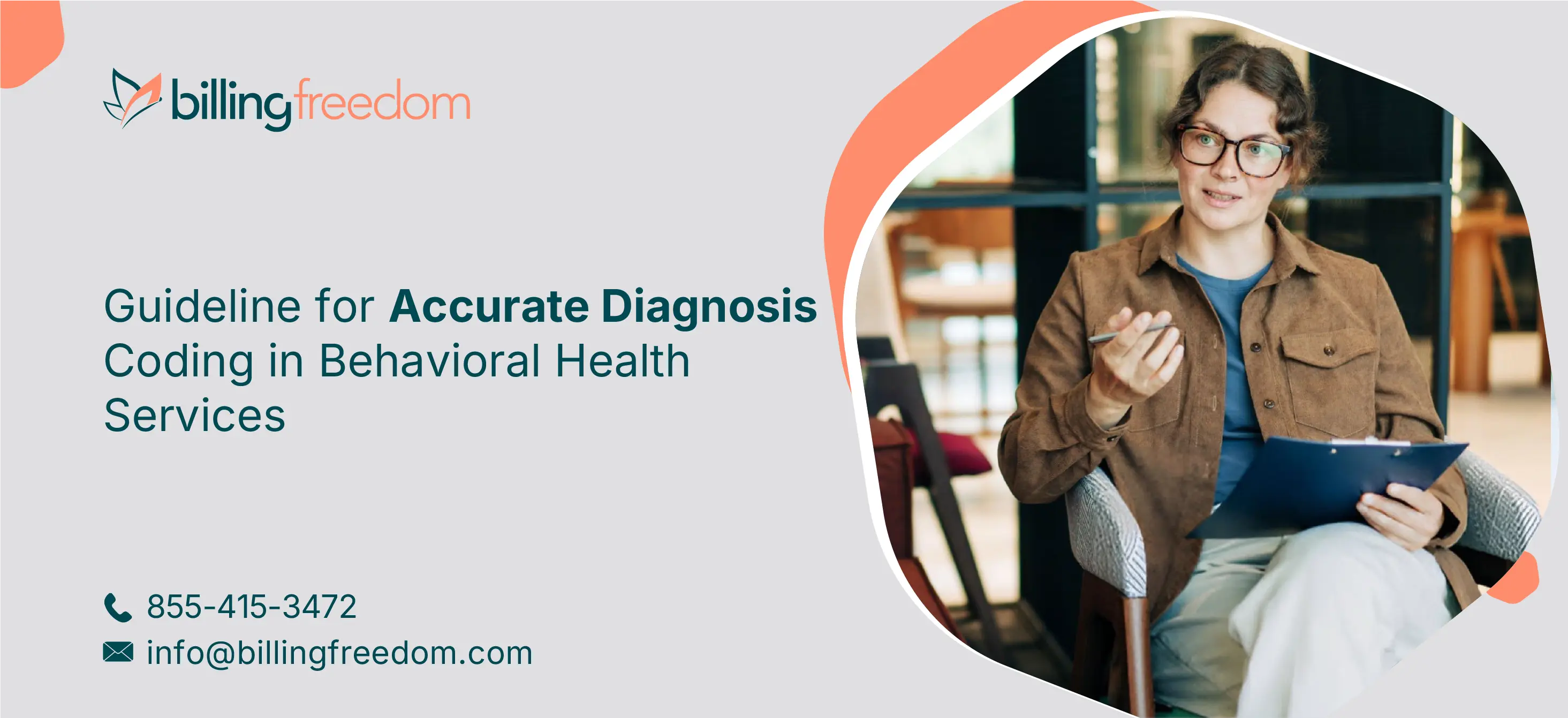
Mental Health Billing & Coding Alert
Effective behavioral health care begins with clear and accurate clinical documentation. For diagnosis coding to be accurate and claim submissions to be valid, the documented diagnoses must consistently reflect the patient's assessment and progress notes.
Consistency Between Clinical Documentation and Claim Diagnoses
To ensure accuracy in behavioral health records and claim submissions, the following documentation practices should be followed so that diagnosis codes align clearly with clinical assessments:
- Ensure that the diagnoses listed on the claim form exactly match those documented in the assessment.
- Diagnosis codes must directly correspond to the information recorded in the clinical note.
- Avoid vague phrases like “stable on medications” or “doing well,” as they do not specify how many conditions were treated.
- Clearly list all conditions that are being managed, including their current status and any treatment provided.
- Document the specific status of each condition.
- Whenever possible, choose a specific and clearly defined diagnosis code.
Common Diagnosis Coding Issues in Behavioral Health
To maintain accuracy and clarity in behavioral health coding, keep the following considerations in mind when selecting diagnosis codes:
- Do not continue using diagnosis codes such as “with psychosis” or “current episode manic” if they no longer reflect the current condition.
- When a substance use disorder is in remission, choose the appropriate remission code instead of using “uncomplicated.”
- If the patient meets diagnostic criteria for major depressive disorder or anxiety disorder, use those codes instead of adjustment disorder with depression or anxiety.
- Avoid using unspecified codes whenever possible.
Overview of DSM-5 in Behavioral Health Diagnosis
The Diagnostic and Statistical Manual of Mental Disorders (DSM), published by the American Psychiatric Association, serves as a primary reference for diagnosing mental health conditions across the United States and much of the world. It offers structured guidelines to ensure consistency in clinical diagnosis and documentation.
- The DSM includes detailed descriptions, symptoms, and diagnostic criteria for mental disorders.
- It also covers diagnostic features, prevalence, development and course, risk and prognostic factors, differential diagnoses, and comorbidities.
- The current edition, DSM-5, contains both outdated ICD-9 codes and updated ICD-10-CM codes.
- It outlines the specific characteristics that define disorders such as major depressive disorder and substance use disorders.
ICD-10 Guidelines for Coding Psychoactive Substance Use Disorders
The ICD-10 guidelines provide specific instructions for coding mental and behavioral disorders related to psychoactive substance use. Accurate code selection relies on clear provider documentation and clinical judgment in the following scenarios:
In Remission
For categories F10–F19, codes indicating remission (such as -.11 or -.21) should be assigned only when supported by provider documentation.
- Mild substance use disorders in early or sustained remission are coded as substance abuse in remission.
- Moderate or severe cases are coded as substance dependence in remission.
Use, Abuse, and Dependence
When documentation includes multiple terms (use, abuse, dependence) for the same substance, follow this hierarchy for coding:
- If both use and abuse are documented, code abuse.
- If both abuse and dependence are documented, code dependence.
- If use, abuse, and dependence are all documented, code dependence.
- If both use and dependence are documented, code dependence.
Unspecified Substance Use
Codes such as F10.9–F19.9 (unspecified psychoactive substance use) should only be assigned when:
- Provider documentation supports their use, and
- There is a documented connection to a physical, mental, or behavioral disorder.
- These codes must meet the criteria of a reportable diagnosis.
ICD-10 Chapter 5: Mental, Behavioral, and Neurodevelopmental Disorders (F01–F99)
This chapter of the ICD-10 classification includes mental, behavioral, and neurodevelopmental disorders. It does not include symptoms, signs, or abnormal clinical or laboratory findings classified under R00–R99.
Included diagnostic categories:
- F01–F09 – Mental disorders due to known physiological conditions
- F10–F19 – Mental and behavioral disorders due to psychoactive substance use
- F20–F29 – Schizophrenia, schizotypal, delusional, and other non-mood psychotic disorders
- F30–F39 – Mood [affective] disorders
- F40–F48 – Anxiety, dissociative, stress-related, somatoform, and other nonpsychotic mental disorders
- F50–F59 – Behavioral syndromes associated with physiological disturbances and physical factors
- F60–F69 – Disorders of adult personality and behavior
- F70–F79 – Intellectual disabilities
- F80–F89 – Pervasive and specific developmental disorders
- F90–F98 – Behavioral and emotional disorders with onset usually occurring in childhood and adolescence
- F99 – Unspecified mental disorder
Why Behavioral Health Providers Trust BillingFreedom for Diagnosis Coding
Behavioral health billing requires more than just submitting claims. It requires accurate diagnosis coding supported by thorough clinical documentation. BillingFreedom specializes in helping behavioral health providers align diagnosis codes with assessment notes, ensuring compliance with DSM-5 and ICD-10 guidelines. From documenting remission status to selecting the right F01–F99 codes, we handle the complexities so you can focus on patient care.
Our team stays up to date with changing requirements, helping you avoid denials from outdated, unspecified, or mismatched codes.
At BillingFreedom, we reduce claim rejections, accelerate reimbursements, and optimize revenue for practices across the behavioral health spectrum. Partner with us for reliable, compliant, and efficient billing support tailored to the needs of mental and behavioral health services.
For more details about our exceptional mental health billing services, please don't hesitate to contact us via email at info@billingfreedom.com or call us at +1 (855) 415-3472.
Your financial tranquility is our priority!
Let's Get in Touch
Please fill up the form, one of our AAPC certified medical biller and coder will reach out to you.




